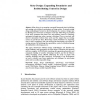Free Online Productivity Tools
i2Speak
i2Symbol
i2OCR
iTex2Img
iWeb2Print
iWeb2Shot
i2Type
iPdf2Split
iPdf2Merge
i2Bopomofo
i2Arabic
i2Style
i2Image
i2PDF
iLatex2Rtf
Sci2ools
102
click to vote
INTERACT
2007
2007
Meta-design: Expanding Boundaries and Redistributing Control in Design
Meta-design is an emerging conceptual framework aimed at defining and creating socio-technical environments as living entities. It extends existing design methodologies focused on the development of a system at design time by allowing users to become co-designers at use time. Meta-design is grounded in the basic assumption that future uses and problems cannot be completely anticipated at design time, when a system is developed. Users, at use time, will discover mismatches between their needs and the support that an existing system can provide for them. Meta-design extends boundaries by supporting users as active contributors who can transcend the functionality and content of existing systems. By facilitating these possibilities, control is distributed among all stakeholders in the design process. This paper characterizes different design methodologies and identifies the unique challenges and opportunities for meta-design. It illustrates this approach with two examples: (a) Web2Gether (...
Design Methodologies | Design Time | Human Computer Interaction | INTERACT 2007 | Meta-design Extends Boundaries |
| Added | 29 Oct 2010 |
| Updated | 29 Oct 2010 |
| Type | Conference |
| Year | 2007 |
| Where | INTERACT |
| Authors | Gerhard Fischer |
Comments (0)

